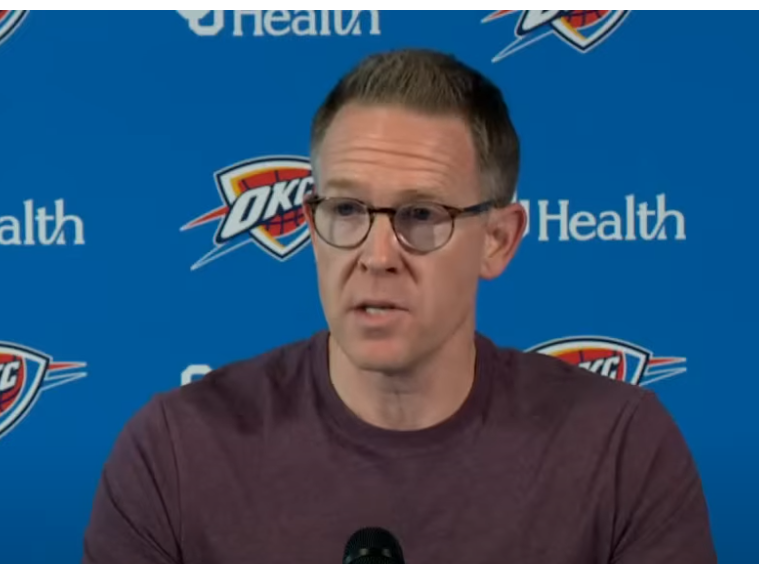Considering the multi-million-dollar salaries that are circulating in elite NBA circles, Sam Presti’s current salary, which is estimated to be $4.5 million, is especially low. That figure, however, has significance that transcends money and cents when compared to the legacy he has meticulously built. His time with the Oklahoma City Thunder has been exceptionally successful in creating long-term stability in addition to rosters.
Presti, who joined the Thunder in 2007 at the age of 30, has served as the organization’s guiding principle in addition to being a general manager. He embraced the difficulties of operating a small-market franchise rather than merely accepting them. He oversaw the selection and development of players like James Harden, Russell Westbrook, and Kevin Durant through strategic planning and an unwavering dedication to growth. Each move required timing, fit, and long-term coherence in addition to skill.
| Attribute | Details |
|---|---|
| Name | Sam Presti |
| Full Name | Samuel Clay Prestigiacomo |
| Birth Date | November 1976 |
| Age (2025) | 48 |
| Birthplace | Concord, Massachusetts, U.S. |
| Education | Emerson College |
| Height | 6 ft 1 in (1.85 m) |
| Current Position | Executive VP & General Manager, Oklahoma City Thunder |
| NBA Tenure | Since 2007 (with OKC) |
| Annual Salary (2025) | $4.5 million |
| Net Worth (Est. 2025) | $35 million |
| Career Earnings (Est.) | $65+ million |
| Major Accolade | 2025 NBA Championship (as GM) |
| Executive of the Year | 2025 (Voted by NBA Peers) |
| Previous Roles | San Antonio Spurs (Video Intern → Assistant GM) |
| Reference |
Presti has drafted 35 players, negotiated player contracts worth almost $2 billion, and managed more than 150 trades in the last 18 years. He significantly enhanced OKC’s scouting and retention tactics early in his tenure by incorporating developmental frameworks and predictive analytics. Even though his pay is much less than that of many well-known executives, it is still indicative of a contract that is probably loaded with incentives, such as playoff victories, strong rookie performances, and benchmarks for franchise valuation.
He received the NBA’s Executive of the Year award from his peers in 2025, which was especially significant given the depth of executive talent on the scene at the time. Nor were the votes close. He received ten votes for first place, far more than rivals Koby Altman and Trajan Langdon. That accomplishment coincided with OKC’s first NBA championship trophy, which was the culmination of years of strategic planning and wise investment.
Presti’s journey from philosophy student at Emerson College to NBA title-winning executive provides an incredibly clear illustration of long-term thinking in a short-term field. Like substitute teachers, many franchises rotate their front desk employees, but OKC stepped up their efforts to build trust. That choice has turned out to be very trustworthy. He is especially creative in his ability to stay true to his core values while adjusting to contemporary demands.
Presti has established an atmosphere that encourages both talent and maturity by working with performance departments and adopting a youth-centered approach. The careers of Shai Gilgeous-Alexander and Chet Holmgren, two celebrities shaped by OKC’s watchful system, have been greatly influenced by him. This method, which was developed gradually but methodically, has greatly decreased the need for ostentatious free agency acquisitions or panic deals. Rather, OKC has emerged as an example of what long-term planning can produce in terms of culture and competitiveness.
Presti assisted OKC in growing its player development pipeline by forming strategic alliances with coaching staff and analytics specialists, transforming the team into a highly adaptable breeding ground for young athletes. Given that OKC routinely has one of the lowest payrolls in the NBA, the organizational efficiency he has fostered is extremely effective. They are still making a lot of money despite not having the financial might of larger markets.
Including bonuses, endorsements, and his early Spurs years, Presti’s total career earnings are estimated to have exceeded $65 million. However, his bank account is not a true indicator of his influence. In league circles, other general managers and coaches cite “the OKC model” as a model worth following, echoing his influence. It’s a system based on principles, constancy, and strategic development, and it succeeds due to Presti’s exceptionally strong leadership.
Presti’s modest pay highlights a more profound reality in the context of contemporary sports business: value isn’t always obvious. It’s frequently found in the quiet times, such as assessing a young player’s demeanor on the practice court, remaining firm during trade talks, or resisting the urge to overpay for short-lived success. Presti has a subtle yet confident style. It is consistently forward-looking, purposeful, and focused.
Presti’s steady hand was crucial during the pandemic years as teams frantically tried to adjust. Without ever straying from the cultural north star he established in 2007, he retooled the team and rebuilt its core. His decisions during that trying time were comforting as well as well-considered. They reaffirmed the type of trustworthy leadership that was valued by coaches, players, and supporters.
The way that Presti’s journey relates to a larger trend in American sports leadership is what makes it so intriguing. General managers are now public figures who must strike a balance between loyalty and profit, performance and morality. They are no longer merely trade brokers. Presti has skillfully struck that balance, preserving his authenticity and credibility in a very unstable environment.
His strategies have gained more public acclaim since OKC’s championship campaign began. Once doubtful of the Paul George deal or critical of the Harden trade, pundits now acknowledge that those actions set the stage for long-term success. Instead of merely placing a wager, Sam Presti constructed the future, one brick at a time. By doing this, he has established himself as one of the most reputable voices in contemporary basketball operations.




